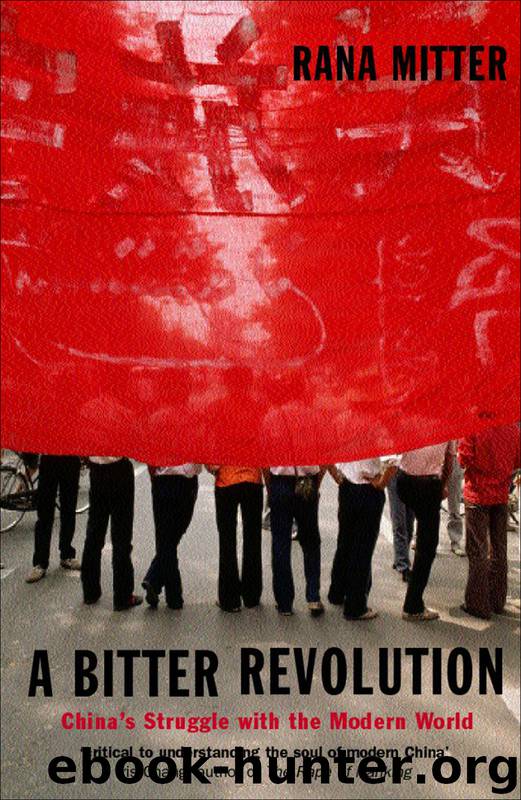A Bitter Revolution by Mitter Rana;

Author:Mitter, Rana;
Language: eng
Format: epub
Publisher: Oxford University Press
Published: 2005-03-09T16:00:00+00:00
War and Confrontation
The outbreak of war liberated Du Zhongyuan. He had served his sentence and been freed from prison in 1936, and in 1937 he set off on yet another path in his picaresque journey through modern China. Now, freed from the political constraints that prevented him attacking the Japanese, he became a war correspondent, joining distinguished contemporaries such as Lu Yi and Fan Changjiang. Du’s war reporting was part of a wider trend towards frontline reporting in China, and it made a special feature of detailed and empathetic reporting of the reality of total war for the Chinese population.34 Du specialized in writing that shifted from the details of everyday experience to the wider political significance of the war itself; his language moved between strident, inspiring, folksy, and even vulgar as he judged the mood of his readership. At one point, he could talk about the problem that ‘the knowledge of people in China’s interior [about the war] is very backward’, and that ‘we ... should set up a central agency [to shape] political opinion’; at another, he could give a shocking account such as the one at the start of this chapter, or describe hiding from an air-raid in a handy bath-house: when he and his companions finally got inside, ‘everyone ate a couple of eggs and lay down for a deep sleep’.35
Although he wrote to gain empathy with his readers, Du also followed a nationalist line that demanded a centralized, unified government, a conclusion that was somewhat ironic considering his own attachment to his Manchurian regional identity, and his sufferings at the hands of the Nationalist government in Nanjing. War, for most political writers on either side of the divide, forced people into strait-jackets of limited choice.
However, there was still enough leeway in those choices to get Du Zhongyuan into what would turn out to be fatal trouble. By mid-1938, China had settled into the three uneasy zones of control that would last for most of the war. Frontline reporting of the terror of battle and refugee flight was less easy now, though journalists both Chinese and foreign continued to describe such scenes as the relentless air-raids on Chongqing, or life in the Yan’an base area run by the Communists. But Du, who had entered journalism as a way of promoting his political agenda, decided to turn his talents elsewhere. Since the mid-1930s, his concern with the ravages that unemployment was causing in China had turned him, along with Zou Taofen, into a sympathizer with the CCP, and he had reported favourably on the Party during his travels to the frontline. This did not make him an out-and-out critic of Chiang Kaishek. Particularly in the early years of the war, the CCP stuck to the line that Chiang was the acknowledged national leader against the Japanese, and Du followed this path in his reporting, savagely attacking fainthearts who doubted Chiang’s ability to fight a war of resistance. Yet the CCP connection also meant that in 1939, Du accepted a new role.
Download
This site does not store any files on its server. We only index and link to content provided by other sites. Please contact the content providers to delete copyright contents if any and email us, we'll remove relevant links or contents immediately.
| Africa | Americas |
| Arctic & Antarctica | Asia |
| Australia & Oceania | Europe |
| Middle East | Russia |
| United States | World |
| Ancient Civilizations | Military |
| Historical Study & Educational Resources |
The Alienist by Caleb Carr(1810)
The Analects of Confucius by Burton Watson(1436)
On China by Henry Kissinger(1375)
China in Ten Words by Yu Hua(1217)
The Last Kings of Shanghai by Jonathan Kaufman(1214)
One Bright Moon by Andrew Kwong(1206)
The Snakehead: An Epic Tale of the Chinatown Underworld and the American Dream by Patrick Radden Keefe(1106)
Deng Xiaoping and the Transformation of China by Vogel Ezra F(1033)
Mao's Last Dancer by Li Cunxin(1033)
Three Tigers, One Mountain by Michael Booth(1017)
Seven Years in Tibet by Heinrich Harrer(1010)
Midnight in Peking by Paul French(970)
Big Sister, Little Sister, Red Sister by Jung Chang(955)
Tiger Trap by David Wise(924)
Ancient Chinese Warfare by Ralph D. Sawyer(859)
China Men by Maxine Hong Kingston(854)
Modern China. A Very Short Introduction by Rana Mitter(840)
The Open Road by Pico Iyer(810)
Riding the Iron Rooster by Paul Theroux(802)
